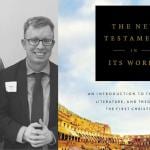Gavin Ortlund has a good video discussion how some low church evangelicals are converting to Catholicism and Ignatius of Antioch is something of a gateway drug. He then discusses the meaning of “bishops” in Ignatius’ letters and offers a standard protestant critique of it.
As to what Ignatius says about bishops:
- “Let us, therefore, be careful not to oppose the bishop, in order that we may be obedient to God.” (Ign. Eph. 5.3)
- “For everyone whom the Master of the house sends to manage his own house we must welcome as we would the one who sent him. It is obvious, therefore, that we must regard the bishop as the Lord himself .”(Ign. Eph. 6.1)
- “Be eager to do everything in godly harmony, the bishop presiding in the place of God and the presbyters in the place of the council of the apostles and the deacons … since they have been entrusted with the ministry of Jesus Christ.” (Ign. Magn. 6.1)
- “Let there be nothing among you that is capable of dividing you, but be united with the bishop and with those who lead.” (Ign. Magn. 6.2)
- “Therefore, as the Lord did nothing without the Father, either by himself or through the apostles (for he was united with him), so you must not do anything without the bishop and the presbyters.” (Ign. Magn. 7.1, italics added in all cases)
There are a few things I’d contest about Gavin’s remarks.
First, I don’t think Ignatius is a monoepisopos, i.e., the single bishop of Antioch. I think he’s one of several house church leaders in the city, but perhaps the most senior, respected, or vocal one, at least as the civil authorities are concerned.
Second, I don’t think episcopos (overseer) and presbyteros (elder) are synonyms, rather, they are perionyms, overlapping terms.
Here’s I’d recommend Alistair C. Stewart, The Original Bishops: Office and Order in the First Christian Communities (Grand Rapids: Baker, 2014).
As I’ve argued in EvTh (2):
Alistair Stewart has presented a cogent account of the origins of episcopacy in the early church. He contends that episkopos (overseer/bishop) and presbyteros (elder) are not synonyms but perionyms, i.e., they overlap. Stewart believes that early congregations had a single episkopos, but when the many episkopoi of a city met together, they became a federated council of presbyteroi. In Miletus, Paul instructed the gathered presbyteroi to be episkopoi of their respective churches (Acts 20:17-18, 28). Similarly, Paul’s instructions to Titus in Crete pertain to the appointment of elders in every town, and he proceeds to discuss the qualification of bishops/overseers (Tit 1:5-9). However, kata polin presbyterous might not be “elders in every town” but “council-of-elders-of-town” (1:5). So Paul was telling Titus to select from among the episkopoi those persons who could serve as a body of presybteroi. The Johannine letters may attest to a division among the Ephesian presbyteroi between John the Elder and Gaius against Diotrephes (2 John 1, 9; 3 John 1, 9). Later, from among the presbyteroi, a single person was elected as a monoepiskopos and charged largely with administrating the financial resources and relief efforts of the local churches (Ignatius, Pol. 4.1, 3; Hermas, Sim. 9.27.2; M.Pol. 16.2; 23.2).
Third, one thing I’d push back on Gavin too, is a multisite church with a senior pastor materially different to a Diocese with a bishop?
Fourth, more positively, concerning what a bishop is meant to be and do, the ordinal of the Australian Anglican church includes this exhortation for bishops:
A bishop is called to maintain the Church’s witness to the resurrection of Christ from the dead, to protect the purity of the gospel, and to proclaim Jesus Christ as Lord. As a chief minister and pastor in Christ’s Church, you are to guard its faith, unity and discipline, and promote its mission in the world. You are to ensure that God’s word is faithfully proclaimed, Christ’s sacraments duly administered, and Christ’s discipline applied justly, with mercy. You are to lead and guide the priests and deacons under your care, and be faithful in the choosing and ordaining of ministers. You are to watch over, protect and serve the people of God, to teach and govern them, and to be hospitable. You must, therefore, know and be known by them, and be a good example to all. These are the duties of a bishop, and they are weighty.












